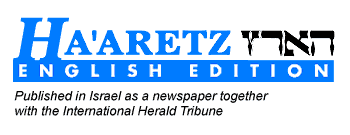
Ha'aretz journalist Daphna Lewy-Yanowitz conducted an interview with me in December 1999 which ended up in this piece.
Captain Internet talks to the people who are building the web in Israel. This week, "A personal diary of the Israeli-Palestinian conflict," by Ramallah-based British journalist, Nigel Parry.
Nigel Parry wrote his Internet diary between 1994 and 1998, the year that his home in Ramallah was destroyed. "After I had gone to live in Ramallah, I suddenly understood that the international media was not reporting on the daily life there and on the reality in which the average Palestinian lives," says Parry, a British journalist and Internet writer. "The media likes to cover leaders and prominent people on both sides, but there were no reports about 'the peace' and the way that it was affecting the average Palestinian at the time."
Parry, a freelance writer and photographer, had studied psychology and English literature at Surrey University in England and afterward worked with several humanitarian organizations. He helped Vietnamese refugees and drug addicts in Hong Kong, and volunteered for the international charity Oxfam, which helps fight hunger. He came to the Middle East to work with Bir Zeit University's public relations department, with which he had been in contact while living in London. Parry sees his highly polished diary, which is housed on the Bir Zeit web server, as another attempt to focus international attention on real events happening to the Palestinian people.
"Most of my work in the West Bank was connected to the media," he says, "and I noticed that most Western journalists preferred to sit at the bar in Jerusalem's American Colony hotel, rather than walk around Palestinian towns and villages. When you live in the midst of them, you suddenly realize that the Palestinians are people like all of us, and you experience for yourself their daily existence - including searches, roadblocks, curfews, army raids at their houses and all the other characteristics of an army of occupation. All of this wasn't happening to some remote group of people that the media had taught us to look on as a threat - it was happening to my friends, who wanted, like everyone else, to see the conflict end."
Parry says that the reports he saw in the media were, on the most part, incomplete and unreliable, and he felt that he had to tell the other story, the true story. The Internet was a perfect vehicle for this goal. "I was writing for people like myself," he explains, "Europeans and North Americans, who were interested in the conflict and whose only source of information was from the mass media. I wanted to tell them what I was seeing with my own two eyes.
"I was also writing for exiled Palestinians, because I believe that they need to know that the Palestinian Authority is not what they had hoped it would be, that there was corruption and repression, and that these were the people determining their future. I also wrote for Israelis - and that, in retrospect, was my most important audience, because there was no sympathetic reporting of the Palestinians in the Israeli media back then. I wanted the Israelis to reach the conclusion that if they wanted peace, they would have to make their government stop treating the peace process like a game of chess, to be won or lost. I wanted them to realize that they had to give the Palestinians a feeling that they are respected, and that their own historical tragedy and needs as a nation are respected."
Parry says that after each demonstration and each prison visit, he spent the night writing and the next day, uploading his work to the Internet. "Once I started using a digital camera, the process became a lot simpler. In some cases, my reports were on the Internet and I would let people know by e-mail so they could come and read them - all within five minutes of the event itself. Thanks to the Internet, I could write whatever I wanted, without an editor cutting my work and without constrictions of space. I combined photographs with video. The links at the bottom of the page brought an awful lot of feedback."
Parry says that 90 percent of the feedback was very positive, while the remaining 10 percent was divided between students asking for more information and hate mail, which was sent mainly by Diaspora Jews. "Jews in Israel actually sent very positive messages," says Parry. "Even West Bank settlers expressed their gratitude that the diary existed."
In addition to his diary, Parry also has web sites dedicated to the state of the Internet in the Middle East, to an exhibition of his photography entitled "The Other Side of Paradise," [sic] to the songs he writes and is currently performing across the United States, and to the poetry [sic] of Bruce Cockburn, which also deals with unresolved social conflicts.
Nigel Parry's personal diary of the Israeli- Palestinian conflict: http://www.birzeit.edu/diary/ [Editor: or http://nigelparry.com/diary/]